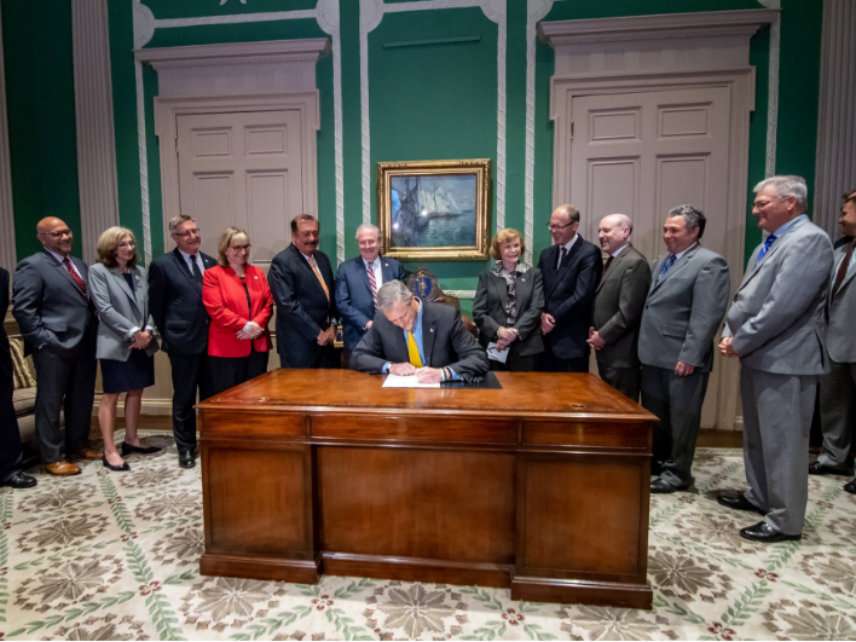Republican Governor Signs $15 Minimum Wage Bill in Terrible 'Grand Bargain'
The Republican governor of Massachusetts just made a deal to give away more freebies and keep taxes high.

On Thursday, Massachusetts Republican Gov. Charlie Baker signed into law a bill that will raise the minimum wage in his state to $15 an hour by 2023 and authorize a generous paid leave program. The governor's goal, it seems, was to stave off a threatened reduction in the sales tax at the ballot box.
Baker touted the legislation as a "grand bargain." But in this case, the winners are those advocating for a higher minimum wage and more mandatory paid leave for workers. The losers, on the other hand, are the voters who won't be able to decide on these issues for themselves—and the taxpayers and businesses who will have to face the consequences of the new policies alongside high sales taxes.
According to the Associated Press, had voters approved a ballot measure lowering the sales tax from 6.25 percent to 5 percent, the state would have lost about $1.2 billion a year.
By agreeing to a compromise that kept the sales tax issue off the ballot, Baker was trying to ensure the state won't lose that revenue. At the same time, he also went out of his way to keep voters from deciding whether or not they wanted to lower the state's sales tax.
The legislation will gradually raise the minimum wage from $11 an hour to $15 an hour by 2023. Tipped workers, meanwhile, will see their minimum pay increase from $3.75 an hour to $6.75 an hour over the next five years. Currently, the only other governors in the country to have signed $15 minimum wage bills into law are Andrew Cuomo of New York and Jerry Brown of California, both Democrats.
Roughly 840,000 worker will get a pay raise, according to the Massachusetts Budget and Policy Center. However, the bill will also eliminate time-and-a-half pay for Sundays by 2023.
Regarding the new paid leave policy, workers will be able to take as much as 12 weeks off if they need to care for either an ill family member or a new baby. They'll be allowed up to 20 weeks to deal with their own health needs. State Rep. Paul Brodeur (D–Middlesex) said it would be the most generous in the country.
Finally, the bill does not lower the state's sales tax, though it does institute an annual sales tax holiday in August.
"I am thankful that all parties came together, compromised and found common ground to produce a better set of policies than what the ballot questions represented," Baker said Thursday. "The Massachusetts workforce continues to grow with more and more people finding jobs and our administration is committed to maintaining the Commonwealth's competitive economic environment."
Though business leaders are concerned about raising the minimum wage to $15 an hour, some seem to think that it was better to implement an increase via a compromise rather than through a ballot measure.
"A lot of small businesses out there are fearful and angry over a potential $15-per-hour minimum wage and a new paid leave mandate, but we have to look at the reality of what we might be able to do through a compromise instead of what would occur through a ballot initiative," Jon B. Hurst, the president of the Retailers Association of Massachusetts, told the Boston Globe. "You don't reach compromises on the ballot. You reach compromise through the legislative process," Hurst added.


Show Comments (71)